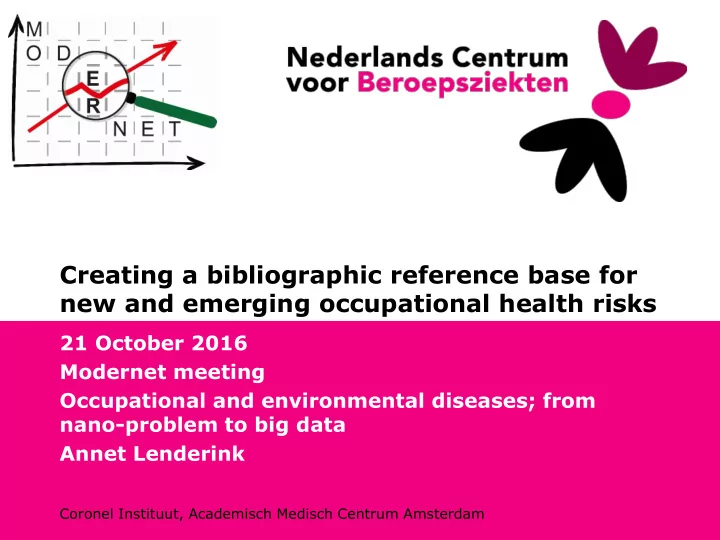

Creating a bibliographic reference base for new and emerging occupational health risks 21 October 2016 Modernet meeting Occupational and environmental diseases; from nano-problem to big data Annet Lenderink Coronel Instituut, Academisch Medisch Centrum Amsterdam
Work Health
New and emerging occupational health risks – finding the unknowns Triangular combinations of health problems, exposure and work setting, in which each of the three components can be new New diseases are rare, so more often • Already known diseases caused by a new or changed way of exposure, or • Already known exposure in new work settings
Finding the unknowns: Signal detection - Possible approaches • Spontaneous reporting of possible new combinations of health problems, exposure and work setting by occupational physicians, general practitioners and medical specialists • Reporting by workers • Active surveillance of health problems in work settings • Periodic screening of scientific literature • Data mining in existing databases • Combine data from existing databases • Secondary analyses of patient data in existing databases
Current situation Information on new occupational • health risks is difficult to find Information is scattered • References are not easy found • So where to turn to, if you see something in your daily practice that you never saw before
Evaluation: Using an assessment in five steps: • Which health problems occur and which disease can be diagnosed? • Is there evidence in the scientific literature substantiating a relation between health problem and suspected exposure? • Is the exposure relevant? • Are other explanations possible? • Final consideration using the Bradford Hill criteria to assess causality
Has someone described it before? What if there were a quick reference database? New and Emerging Risks DataBase: NERDB?
NERDB? Requirements: • Simple • Adjustable • Online access but not public • Accessible after permission • Connect to (pdf)-files • Search function available • No limits to the number of records • Cheap
https://www.obvibase.com/#table/ dFxelpBva19s/*
Each column can be adjusted and edited Literature files can either be added by storing them in a shared Dropbox file or through a URL
NERDB: what do we need more? More records from different sources • More participating experts • Comments on existing records • Adding literature to existing records • …. • …. •
a.f.lenderink@amc.uva.nl
Recommend
More recommend